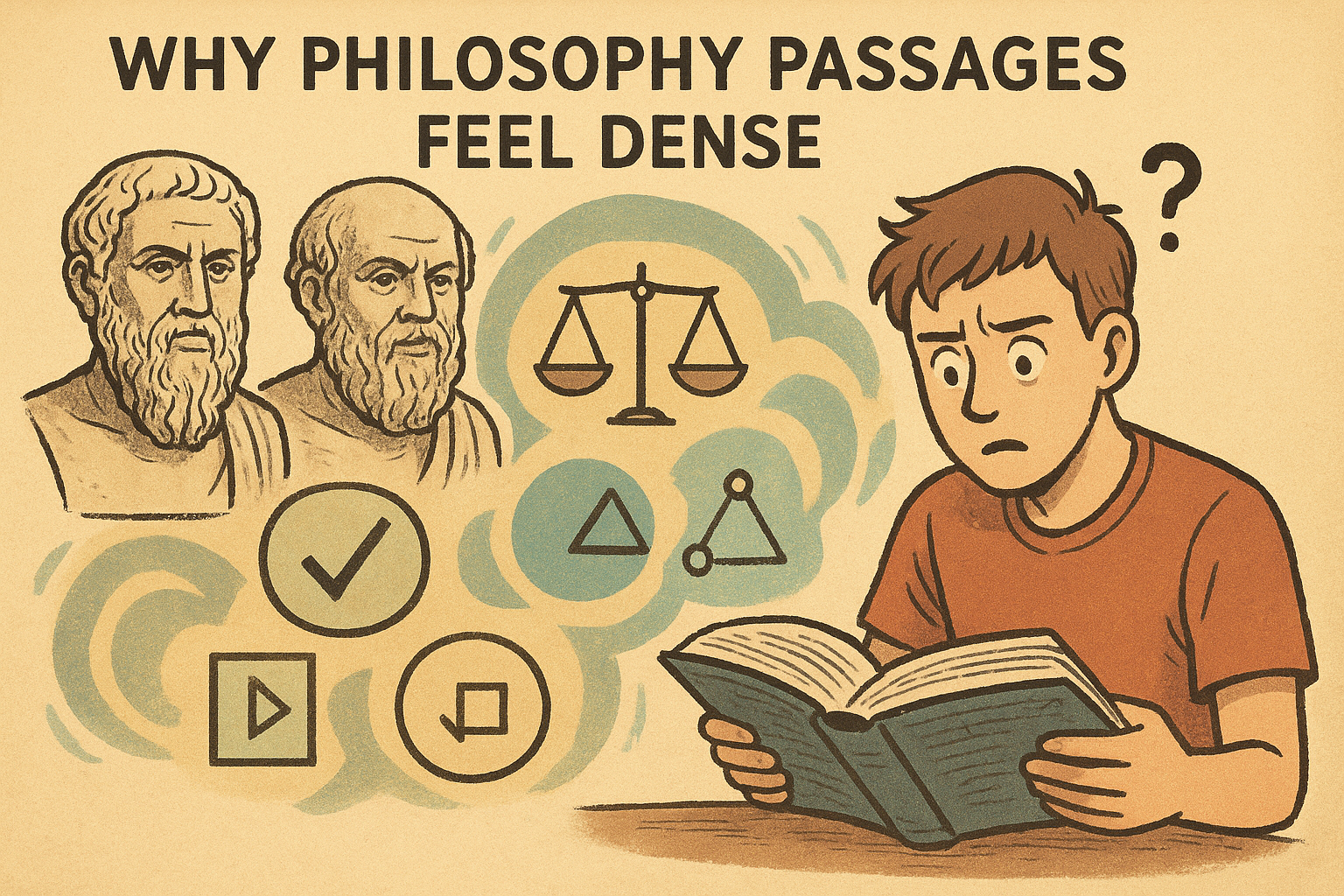Why Philosophy RCs Feel So Tough And How You Can Crack Them

If you’ve ever stared at a philosophy passage during VARC and felt your brain go foggy, you’re definitely not alone.
Unlike other RCs, philosophy passages don’t come with a story or familiar context. Instead, you get abstract terms, dense sentences, and a lofty tone that feels far removed from the real world.
So why do they feel so brutal? Let’s break it down.
Why Do Philosophy Passages Feel Dense?
Philosophy passages usually revolve around abstract concepts like truth, knowledge, morality, and the limits of reason. Instead of narrating a story, they build arguments.
The author often talks about old philosophers like Plato, Socrates, or Kant, and explains how their ideas fit into the topic. This is why the tone tends to be objective and analytical, many times argumentative, rather than personal.
Even though the writing feels heavy, the ideas are not random. Philosophers rely on logic, so if you train yourself to follow the reasoning, you can follow their arguments.
The Secret Weapon: Active Reading
The biggest mistake is reading passively and hoping everything will make sense later. That won’t work here. You must read actively. At the start, this means writing quick notes after each paragraph. Summarise the main idea in just a few words.
- Keep it short: “Plato → forms vs. reality.
- Don’t waste time: write it in 10 seconds.
- Break long paragraphs: if one paragraph has three different points, split it into three quick notes.
Here’s the important part: note-taking is just a crutch. In the long run, you should aim to make mental notes instead of written ones. The point is to build the habit of spotting the core argument and keeping track of the flow. Once you finish the passage, review your notes. You’ll see how paragraphs connect and grasp the overall main idea, making questions much easier to answer.
How to Tackle Philosophy RC Questions?
Philosophy RC questions often ask “why.” Why did the author use this example? Why mention this philosopher? With notes in hand, you’ll already know the answer.
Some tips:
- You don’t need 100% clarity. Even if you miss 20% of the passage, the remaining 80% is usually enough.
- Never skip lines; doing so breaks the chain of reasoning and forces you to re-read
- For title-based questions, use your notes to capture the big picture. Eliminate options that are too broad or too narrow.
- Always check accuracy: if you miss a question, compare your notes with the passage to see where your reading went off-track.
How to Handle Tricky Philosophy Words?
Philosophy is full of intimidating words like empiricism, teleology, or a priori. You don’t need exact dictionary definitions. Just know which “family” they belong to:
- Empiricism: knowledge comes from the senses.
- Rationalism: knowledge comes from logic/reason.
- Faith: knowledge comes from belief in God or a higher power.
Once you know the family, you can follow the argument more easily and avoid traps in the answer choices.
What to Read to Prepare for Philosophy RCs
Don’t waste time reading Plato or Aristotle directly. The language is too tough. Instead, read simplified books or essays that explain their ideas.
- Sophie’s World by Jostein Gaarder
- The Story of Philosophy by Will Durant
Both are simple, lucid, and give you a broad sweep of philosophical ideas in plain English. Beyond books, get into the habit of reading philosophical articles online. Each time you stumble on a new term or concept, do a quick Google search. Filling these small gaps adds up, and suddenly passages that once felt alien start to feel familiar.
Final Takeaway: Cracking Philosophy RCs
Philosophy RCs test your focus, not your background knowledge. They want to see if you can:
- Identify the main question the author is addressing. In philosophy RCs, the “main question” is the central puzzle or problem the passage is built around. For example, can knowledge exist without experience? Or is morality objective or relative? Every paragraph, example, or philosopher mentioned usually ties back to that one core issue.
- Follow the author’s line of reasoning.
- Separate the main idea from extra details.
With steady practice in active reading and by building familiarity with common philosophical terms, you’ll find that these passages aren’t walls of text. They’re puzzles. And like any puzzle, once you know the moves, they’re not just solvable, they can actually be enjoyable.
